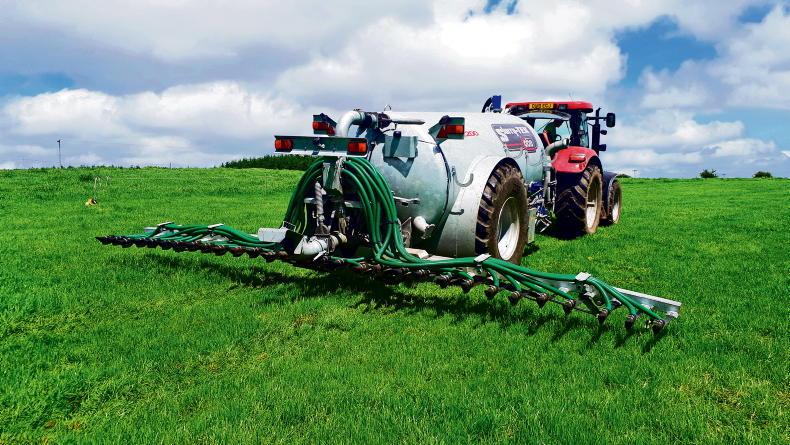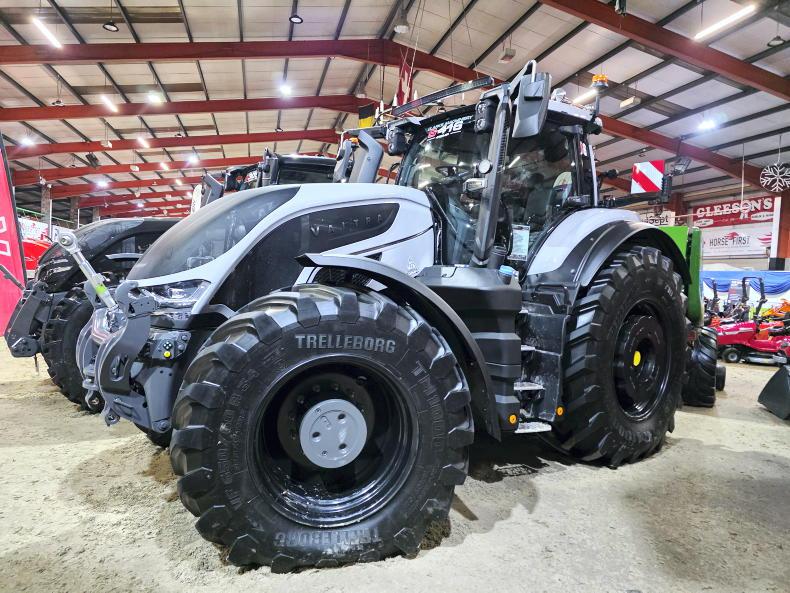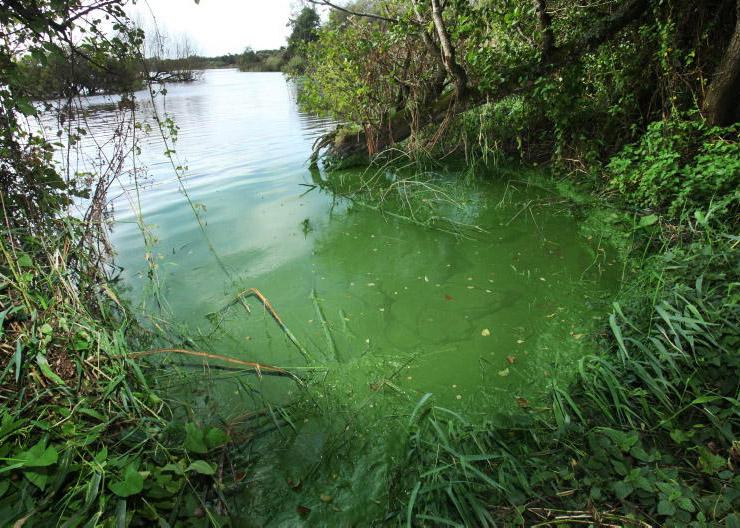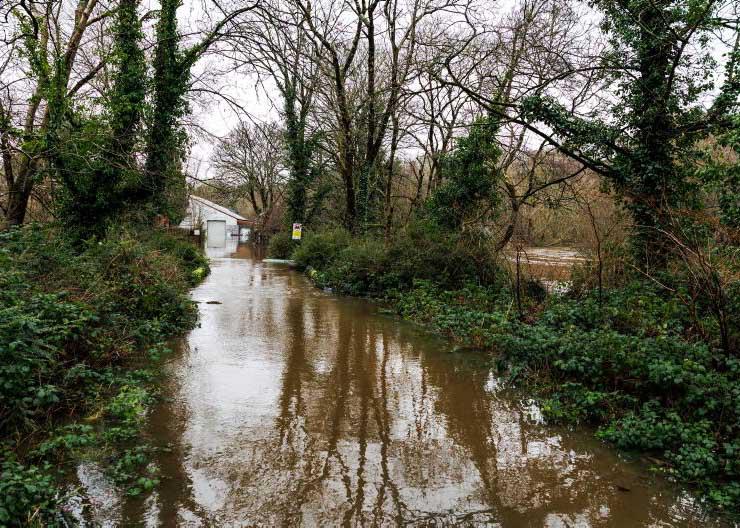Over 30 years ago, four French farmers started to share a round baler in western France. Now Contrevents Verts Co-op owns a fleet of over 45 machines, with balers, trailers, manure spreaders, a tractor, ploughs, harrows and sub-soilers.
The co-op also built a solar-powered shed and has 37 members and nine committee members. When it wants to buy a machine, it puts 20% of its value into the CUMA share capital and borrows the rest.
This was one of the farms that the Kilnamartrya discussion group from Cork visited when it went on a fact-finding mission to learn about machine sharing in France.
For the last three months, four members of the west Cork discussion group have been sharing a top-of-the-range slurry tanker.
So how does the sharing work? The four farmers are members of a discussion group for the last 20 years, so they know each other well.
Three are living relatively close to each other and one member is a 30-minute drive away. All are dairy farmers.
When one of the farmers wants the machine, he drops a message into the group that he is looking to book the tanker for two days next week. When it is booked out on farm, the farmers aim to keep the machine working, so its use is maximised and it’s fair to the other farmers.
The machine is then returned to the next farmer and all details recorded in a written record (date of usage, how many hours, etc). A photo of this written record is taken and shared with the group members. This means everyone is up to date at all times.
The group has two methods of recording usage of the machine. They have a written record of usage in a sealed container on the machine and they have a WhatsApp group where they share the details and book the machine for usage (see video).
The slurry tanker has an odemeter to record hours used.
In a similar way to renting a car, when you come to use it you walk around the tanker, note any issues and sign off on taking the tanker. When you return after completing your work, the next farmer will do the same thing.
How did they set up?
Some members of the Kilnamartyra discussion group had French students over on a work experience exchange and a discussion started about how machinery sharing works in France.
For their annual trip, the west Cork farmers decided to go to France. When Teagasc’s Thomas Curran saw the article about the trip to France in the Irish Farmers Journal, he made contact with the farmers and subsequently went to France also.
Thomas is now regional manager in west Cork and Gordan Peppard is the Teagasc farm business structures specialist.
Some key people that helped Thomas and the farmers in France were: Christine Ferrier (Formerly of FN CUMA); Stéphane Diard (dairy farmer and board member of FN CUMA) and Luc Vermuelen (president of FN CUMA).
The French welcomed the interest from Ireland and encouraged the study visit and provided lots of support.
In November 2018, Comharcumann Gleann an Laoi (the name selected for the west Cork machinery co-op) was registered with the Friendly Societies Register for co-operatives, which is maintained by the Companies Registration Office (CRO).
It is Ireland’s first farm machinery sharing co-operative, formed by members of the Kilnamartyra dairy discussion group near Macroom in west Cork.
This machinery co-op provides the business structure for the sharing of machinery between farmers.
What’s the objective?
The main objective of a machinery co-operative is to provide machinery and make it available to co-operative members at a lower cost than buying machinery individually. Therefore, it operates as a non-profit/breakeven entity.
How does slurry tank hire work?
Based on the individual usage of the machine, the co-op will hire the machinery to the members.
The members contributed 20% of the machine purchase price as share capital. The remaining capital balance is financed with the bank.
So, in this west Cork example, the three farmers who invested share capital hire the tanker from the co-op for a fixed fee (per day, per hour, per load, per hectare). In this example, the approximate cost works out at about €100/day for use of the slurry tank.
Colm Kelleher didn’t put up share capital, but he is still a co-op member and his daily hire rate is higher.
The rental fees ensure that the co-op will have funds available to repay bank loans and cover running costs, including repairs and maintenance, depreciation of the machine and administration costs.
Donal Casey of Bank of Ireland was in west Cork last week to see the machine in operation.
He said: “The bank is delighted to support the innovative machinery co-op with its first investment. The availability of Dairyflex financing through Dairygold Co-op enabled the co-op to access finance for the slurry tank at 3.55% unsecured.
“Dairyflex has now been extended to seven co-ops nationally. Investment in Low Emissions Slurry Spreading (LESS) equipment is one of many actions farmers can take in making their contribution to lowering emissions from agriculture and we are delighted to support any investment that improves the overall sustainability of food production.”
So will the west Cork farmers invest in more machinery?
Brendan Hinchion said: “Look we are only up and going. We’ll all sit down at the end of the year and have a good chat about how it is going.
“Other machines have been mentioned, like a bale trailer or a post driver or maybe even a high-powered tractor.”
Potential benefits and drawbacks
Access to more modern, efficient and environmentally friendly machinery at a lower cost to the member.Access to machines that are only occasionally used. For example, a stone cart for land drainage or a post driver.Farm safety. The co-op sets high standards in the safe use of the machinery with compulsory training courses in the correct and safe operation of the machines. New entrants to farming can reduce the set-up costs for young farmers. Registered machinery co-ops are eligible for TAMS for LESS equipment and for various machines under the tillage scheme.Disadvantages
Machine availability at certain times of the year. For example, bad weather is forecast and three farmers are in need of the machine at the same time. Poor communication or misunderstanding causing fallout between co-op members All members take the hit financially for potential damage caused by one farmer. The use of the machine requires quite a bit of planning. For example, Farmer A can’t just decide he is going to use the machine right away to slurry a small paddock. This depends on availability and where the machine is located. How does a co-op operate?
In order to set up a co-operative, a group of at least seven members must come together with a common purpose in mind. There are two documents required:
A machine-specific sharing agreement
This is a set of rules created by the members for the purchase, usage and maintenance of the machine.
The co-op statutory rule book
The co-operative members must create a rule book to satisfy Irish and international regulations that govern co-operatives. The Irish Co-operative Organisation Society (ICOS) has created a rule book specially tailored to the needs of machinery co-operatives.
Decisions are made on the basis of a democratic voting process and each member has one vote in any decision regardless of the number of shares they own in the co-operative.
A board must be formed and members of the co-op must elect a chair, secretary and treasurer to run the co-op on an ongoing basis, while also implementing the rules of machinery sharing as created by the members.
A co-op is registered with the Friendly Societies Register, which is maintained by the Companies Registration Office. It is a corporate entity that enjoys limited liability in the same way as a limited company.
Thomas Curran’s step-by-step guide to setting up a machinery co-op
1 Identify an existing discussion group (or a group of like-minded farmers) with at least seven members who are committed to the formation of a machinery-sharing co-operative.
The farmers in the group must identify a common need in terms of machinery use. Identify a key influencer within the group to drive the process forward.2 Start with one project, one machine:
Group defines a bespoke rule book for use of the machine by members.Rules enforced by chair of co-operative.3 Complete the ICOS business plan template for the
co-operative.
4 Create a financial plan based on usage of the machine:
Projected usage of the machine.Unit of usage, eg hectares, volume, kilometres.Estimated usage by each co-op member.5 Share capital contribution:
Between 5% and 20% of purchase price.Total divided by proportional usage by members.6 Projected co-op income in rental fees:
a Repairs and maintenance costs.
b Loan repayments.
c Depreciation.
d Admin costs.
7 Engage with ICOS to create legal framework for the co-operative & register the co-operative with the Companies Registration Office (CRO).
a Seven members – co-operative board.
b Election of a chair, secretary and treasurer.
c Other shareholders.
d Legal rule book (ICOS).
8 Engage an accountant to oversee taxation and preparation of annual accounts for the CRO.
The OBE slurry tank
The west Cork farmers decided to go with the 2,200 gallon OBE-manufactured slurry tank, as it has a low centre of gravity that suits the hilly farms. Darryl Hylands from OBE was in west Cork last Friday to see the tank in operation. There were some teething issues with the tank when it arrived in Cork at the start of the year and most of these have now been fixed.
As Darryl said, there are 193 modifications that OBE can make to a slurry tank, so farmers can pretty much decide what they want. The retail price of the tank for the machinery co-op comes in around £46,000 sterling (€54,000) net, as the specification is high with the lazy arm, inlet macerator, outlet macerator, double folding trailing shoe and galvanised tank.
Read more
French style machinery sharing - will it work in Cork?
Scaling down and adding value to protect income after accident
Watch and listen: Cork farmers look to import French methods
In pictures: impressive machinery shed shared across 37 French farms
Over 30 years ago, four French farmers started to share a round baler in western France. Now Contrevents Verts Co-op owns a fleet of over 45 machines, with balers, trailers, manure spreaders, a tractor, ploughs, harrows and sub-soilers.
The co-op also built a solar-powered shed and has 37 members and nine committee members. When it wants to buy a machine, it puts 20% of its value into the CUMA share capital and borrows the rest.
This was one of the farms that the Kilnamartrya discussion group from Cork visited when it went on a fact-finding mission to learn about machine sharing in France.
For the last three months, four members of the west Cork discussion group have been sharing a top-of-the-range slurry tanker.
So how does the sharing work? The four farmers are members of a discussion group for the last 20 years, so they know each other well.
Three are living relatively close to each other and one member is a 30-minute drive away. All are dairy farmers.
When one of the farmers wants the machine, he drops a message into the group that he is looking to book the tanker for two days next week. When it is booked out on farm, the farmers aim to keep the machine working, so its use is maximised and it’s fair to the other farmers.
The machine is then returned to the next farmer and all details recorded in a written record (date of usage, how many hours, etc). A photo of this written record is taken and shared with the group members. This means everyone is up to date at all times.
The group has two methods of recording usage of the machine. They have a written record of usage in a sealed container on the machine and they have a WhatsApp group where they share the details and book the machine for usage (see video).
The slurry tanker has an odemeter to record hours used.
In a similar way to renting a car, when you come to use it you walk around the tanker, note any issues and sign off on taking the tanker. When you return after completing your work, the next farmer will do the same thing.
How did they set up?
Some members of the Kilnamartyra discussion group had French students over on a work experience exchange and a discussion started about how machinery sharing works in France.
For their annual trip, the west Cork farmers decided to go to France. When Teagasc’s Thomas Curran saw the article about the trip to France in the Irish Farmers Journal, he made contact with the farmers and subsequently went to France also.
Thomas is now regional manager in west Cork and Gordan Peppard is the Teagasc farm business structures specialist.
Some key people that helped Thomas and the farmers in France were: Christine Ferrier (Formerly of FN CUMA); Stéphane Diard (dairy farmer and board member of FN CUMA) and Luc Vermuelen (president of FN CUMA).
The French welcomed the interest from Ireland and encouraged the study visit and provided lots of support.
In November 2018, Comharcumann Gleann an Laoi (the name selected for the west Cork machinery co-op) was registered with the Friendly Societies Register for co-operatives, which is maintained by the Companies Registration Office (CRO).
It is Ireland’s first farm machinery sharing co-operative, formed by members of the Kilnamartyra dairy discussion group near Macroom in west Cork.
This machinery co-op provides the business structure for the sharing of machinery between farmers.
What’s the objective?
The main objective of a machinery co-operative is to provide machinery and make it available to co-operative members at a lower cost than buying machinery individually. Therefore, it operates as a non-profit/breakeven entity.
How does slurry tank hire work?
Based on the individual usage of the machine, the co-op will hire the machinery to the members.
The members contributed 20% of the machine purchase price as share capital. The remaining capital balance is financed with the bank.
So, in this west Cork example, the three farmers who invested share capital hire the tanker from the co-op for a fixed fee (per day, per hour, per load, per hectare). In this example, the approximate cost works out at about €100/day for use of the slurry tank.
Colm Kelleher didn’t put up share capital, but he is still a co-op member and his daily hire rate is higher.
The rental fees ensure that the co-op will have funds available to repay bank loans and cover running costs, including repairs and maintenance, depreciation of the machine and administration costs.
Donal Casey of Bank of Ireland was in west Cork last week to see the machine in operation.
He said: “The bank is delighted to support the innovative machinery co-op with its first investment. The availability of Dairyflex financing through Dairygold Co-op enabled the co-op to access finance for the slurry tank at 3.55% unsecured.
“Dairyflex has now been extended to seven co-ops nationally. Investment in Low Emissions Slurry Spreading (LESS) equipment is one of many actions farmers can take in making their contribution to lowering emissions from agriculture and we are delighted to support any investment that improves the overall sustainability of food production.”
So will the west Cork farmers invest in more machinery?
Brendan Hinchion said: “Look we are only up and going. We’ll all sit down at the end of the year and have a good chat about how it is going.
“Other machines have been mentioned, like a bale trailer or a post driver or maybe even a high-powered tractor.”
Potential benefits and drawbacks
Access to more modern, efficient and environmentally friendly machinery at a lower cost to the member.Access to machines that are only occasionally used. For example, a stone cart for land drainage or a post driver.Farm safety. The co-op sets high standards in the safe use of the machinery with compulsory training courses in the correct and safe operation of the machines. New entrants to farming can reduce the set-up costs for young farmers. Registered machinery co-ops are eligible for TAMS for LESS equipment and for various machines under the tillage scheme.Disadvantages
Machine availability at certain times of the year. For example, bad weather is forecast and three farmers are in need of the machine at the same time. Poor communication or misunderstanding causing fallout between co-op members All members take the hit financially for potential damage caused by one farmer. The use of the machine requires quite a bit of planning. For example, Farmer A can’t just decide he is going to use the machine right away to slurry a small paddock. This depends on availability and where the machine is located. How does a co-op operate?
In order to set up a co-operative, a group of at least seven members must come together with a common purpose in mind. There are two documents required:
A machine-specific sharing agreement
This is a set of rules created by the members for the purchase, usage and maintenance of the machine.
The co-op statutory rule book
The co-operative members must create a rule book to satisfy Irish and international regulations that govern co-operatives. The Irish Co-operative Organisation Society (ICOS) has created a rule book specially tailored to the needs of machinery co-operatives.
Decisions are made on the basis of a democratic voting process and each member has one vote in any decision regardless of the number of shares they own in the co-operative.
A board must be formed and members of the co-op must elect a chair, secretary and treasurer to run the co-op on an ongoing basis, while also implementing the rules of machinery sharing as created by the members.
A co-op is registered with the Friendly Societies Register, which is maintained by the Companies Registration Office. It is a corporate entity that enjoys limited liability in the same way as a limited company.
Thomas Curran’s step-by-step guide to setting up a machinery co-op
1 Identify an existing discussion group (or a group of like-minded farmers) with at least seven members who are committed to the formation of a machinery-sharing co-operative.
The farmers in the group must identify a common need in terms of machinery use. Identify a key influencer within the group to drive the process forward.2 Start with one project, one machine:
Group defines a bespoke rule book for use of the machine by members.Rules enforced by chair of co-operative.3 Complete the ICOS business plan template for the
co-operative.
4 Create a financial plan based on usage of the machine:
Projected usage of the machine.Unit of usage, eg hectares, volume, kilometres.Estimated usage by each co-op member.5 Share capital contribution:
Between 5% and 20% of purchase price.Total divided by proportional usage by members.6 Projected co-op income in rental fees:
a Repairs and maintenance costs.
b Loan repayments.
c Depreciation.
d Admin costs.
7 Engage with ICOS to create legal framework for the co-operative & register the co-operative with the Companies Registration Office (CRO).
a Seven members – co-operative board.
b Election of a chair, secretary and treasurer.
c Other shareholders.
d Legal rule book (ICOS).
8 Engage an accountant to oversee taxation and preparation of annual accounts for the CRO.
The OBE slurry tank
The west Cork farmers decided to go with the 2,200 gallon OBE-manufactured slurry tank, as it has a low centre of gravity that suits the hilly farms. Darryl Hylands from OBE was in west Cork last Friday to see the tank in operation. There were some teething issues with the tank when it arrived in Cork at the start of the year and most of these have now been fixed.
As Darryl said, there are 193 modifications that OBE can make to a slurry tank, so farmers can pretty much decide what they want. The retail price of the tank for the machinery co-op comes in around £46,000 sterling (€54,000) net, as the specification is high with the lazy arm, inlet macerator, outlet macerator, double folding trailing shoe and galvanised tank.
Read more
French style machinery sharing - will it work in Cork?
Scaling down and adding value to protect income after accident
Watch and listen: Cork farmers look to import French methods
In pictures: impressive machinery shed shared across 37 French farms










SHARING OPTIONS